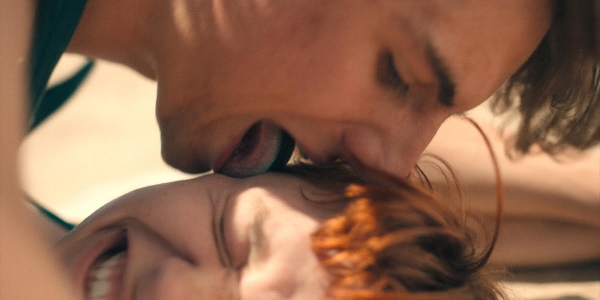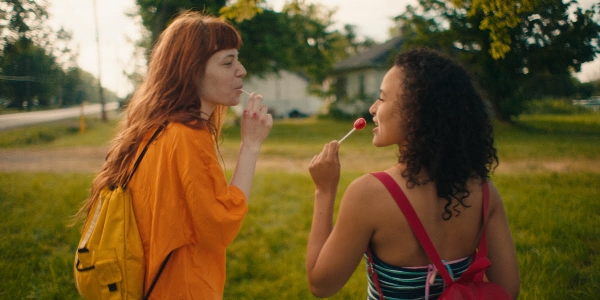READ ME is a platform for female-led writing on film hosted by Girls on Tops. Louisa Maycock (@louisamaycock) is Commissioning Editor and Ella Kemp (@efekemp) is Contributing Editor.
A year since Tracy Letts introduced our GRETA GERWIG t-shirt to the world via the Lady Bird red carpet at the Toronto International Film Festival, READ ME launches with an exploration of the filmic language of two female-directed films from this year’s TIFF.
Under the male gaze, we are looked at, dissected and celebrated as objects. Shiny, sexy objects, but we are not the ones in control of the act of looking, of touching. The male gaze is a theory and practice that feminist academia has been reckoning with since 1975. Film critic Laura Mulvey coined the term in reference to the way women are represented across art and literature. It’s a concept that still exists, but to resign to its determinations and submit to the role of angry victims would be to ignore the trailblazing female artists forcing the world to look through their eyes. By “their”, to clarify, I mean all of the “her”s. However, if a film is directed by a woman, this doesn’t automatically entail an female gaze. Attempting to define it in direct and simple opposition to the male gaze would be doing a disservice to the fluency of the term. For the sake of this discussion, the focus is on the specific potential of tactile control. It’s one strand of many that is consistently being played with and reinvented in the understanding of what the female gaze really is.
Lisa is fascinated by Jimmy because of his words. After her day shifts, she takes poetry classes where her ideas are put on the line, under scrutiny by her classmates and docile teacher (a gorgeous and gormless Gael Garcia Bernal). But where words fill her mind, she gains control through her touch: rubbing her students tiny hunched backs, greeting her daughter with an ankle rub and kissing her husband before he reaches morning consciousness. It’s in this war between physical affection and mental attraction that Colangelo steers a female gaze onto the people that Lisa demands in her life.
Canadian filmmaker Jasmin Mozaffari borrows from the visual effervescence of Andrea Arnold circa American Honey for her feature debut Firecrackers. Lou (Michaela Kurimsky) and Chantal (Karena Evans) are two teenagers with hunger in their eyes - from the very beginning, they know they have to escape their isolated, dilapidated town. Relying on a ride from one of their male friends, the ideals of power soon dissolve when they realise that reclaiming their identity, often determined by their sexuality, can only count on their own ruling.
“I know you miss this dick”, Chantal’s ex romantically texts. She’s the one to read out this plea for some kind of reunion, taking charge of the relationship in which she now literally and metaphorically holds the reins. Bodies are vital in determining the relationships Lou and Chantal maintain with the boys and men who surround them. Flirting with serious intent to ensure their best friend drives them where they need to be, it’s the movement in their skin that determines who has the emotional upper hand.
Both films give great emphasis to the close-up in order to gain a deeper understanding of who needs to be looking, and what is at stake. Lisa’s eyes are blue and starving. The camera lingers on her before then turning around to see what she needs. The scar between Lou’s eyebrows forms a pale dent, it’s a fascinating detail that looks like a secret told in confidence. The patience in aesthetics allows a richer picture of these women to form, and then makes their physical unravelling all the more engaging.
In Lisa and Jimmy’s final moments together, the time she touches and looks at him makes his ultimate decision all the more complex. What began as a curiosity about talent has grown into an alarming relationship. It’s not one of perverse fear or caricatural disgust, but the way she protects him with her own persistent touch massages our understanding of what is acceptable, leading us to question how any other outcome could exist. After Lisa tells him that one day, the world will erase him until he’s a shadow like her, Jimmy reaches for her hand and squeezes it. Lou needs her friendship with Chantal, but she also needs force within herself. When faced with a betrayal, she reclaims dominance without needing to speak. She takes her time removing her clothes, uses her hands to hide her prey’s neck, obscuring his face while her body dictates the power he needs to understand. When she’s finished, she asks him about the way he behaved: the cocking of a gun, the submission to his own lack of emotions. “I don’t know why I do things sometimes”, he admits. There is no perfect empowerment to the way that Lou and Chantal are used and must acquiesce in their chase for independence, but in the fluidity with which they free their bodies each time, there’s a stirring encouragement of what a woman can do, all on her own.
It’s not impossible for a man to understand a woman’s experience and to film it with great dignity. Across the festival, titles that will be talked about for months offer a powerful and subversive portrait of womanhood. Vox Lux, Widows, Angel and even Teen Spirit (all directed by men) give great focus to women through their art and emotions. But in the corporal fascination and deliberate pursuit of emotional control, The Kindergarten Teacher and Firecrackers salvage an authority in the female gaze that cannot be forgotten.
Ella Kemp (@efekemp) is a film critic and photographer based in London. She has a bachelor’s degree in Film & TV studies and maintains a passionate love for good design and great relationships on screen. She always has a lot of feelings and writes about them for Culture Whisper, Little White Lies, the Quietus, Sight & Sound and more.


 At this year’s Toronto International Film Festival, women thrived. On the ground, on the screen and behind the camera, there is now a deliberate consciousness encouraging the lens through which we see art to widen, and in some instances, for the perspective to completely flip. Two films, in particular, offer a very direct representation of the importance of a woman’s control over what she chooses to pursue in order to be satisfied. This includes the relationships she chases, the way she visually and viscerally nurtures them, and the way that a woman’s gaze affects the level of control given to the people involved.
At this year’s Toronto International Film Festival, women thrived. On the ground, on the screen and behind the camera, there is now a deliberate consciousness encouraging the lens through which we see art to widen, and in some instances, for the perspective to completely flip. Two films, in particular, offer a very direct representation of the importance of a woman’s control over what she chooses to pursue in order to be satisfied. This includes the relationships she chases, the way she visually and viscerally nurtures them, and the way that a woman’s gaze affects the level of control given to the people involved.

